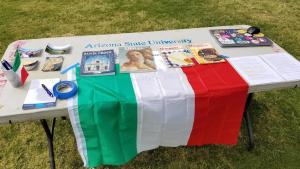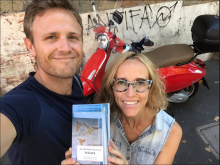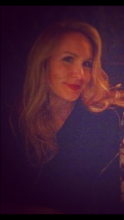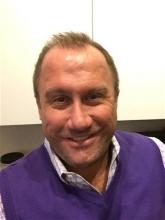Overview
The Italian program will provide you with opportunities to get an insight into Italian culture and society. It will be the key to appreciating a unique historical and artistic heritage. Knowing Italian is also the first step toward knowing another Romance Language and becoming a multilingual individual in a short amount of time. What an advantage in this multicultural society!
In the Italian program, you will study areas such as:
- Language and culture.
- Literature.
- Business and professions.
- Pop culture.
- Italian cinema.
- Ecology and environment.
- Digital humanities.
- Romance language mutual understanding.
- Cultural awareness prior to studying abroad.
In today's global economy, the ability to communicate is key and as more companies expand internationally, the ability to communicate in another language has become a significant advantage in the workforce. Knowing Italian is synonymous with an open and curious mind, willingness to explore another culture, good listening and communication skills, which make you a great teammate, productive and collaborative. It is a gateway to many professional options.
Looking at the future, some career paths benefiting from the knowledge of Italian are:
- Teaching and translation.
- Marketing and business.
- Graphic design.
- International law.
- Real estate.
- Journalism.
- Performing arts.
- Museums and tourism.
- Culinary industry and more!
The Italian program at ASU offers major, minor and concurrent degrees in Italian language and culture. Great degree combinations are with all Liberal Arts and Science degrees, but for dynamic career options, our students have paired their Italian studies with:
- Business.
- Design and arts.
- Journalism.
- Interdisciplinary studies.
- Law.
- Sustainability.
- Education.
- Nursing and health.
- History.
- Philosophy.
- Music.
Coupling our robust Italian program with another ASU field can only benefit you personally and your future career! Contact our advisors today to find out how you can learn Italian.
Degrees
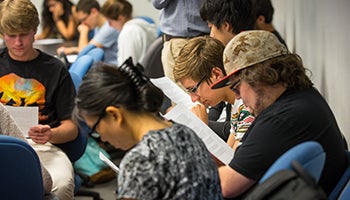
Bachelor or Arts in Italian
Studying Italian unlocks the doors to Italy's culture and language, as well as careers in design, fashion, food, sustainability, health and wellness, manufacturing, computer services, and the aerospace and automotive sectors. Due to Italy's rich history, quality of life and industrial leadership, Italian is the fourth most studied language globally.
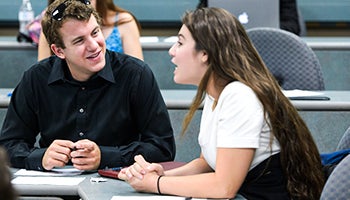
Minor in Italian
Delve into the rich history and culture of Italy. Italy is a leader in global innovation in several industries, including art, fashion and food. Knowledge of Italian is critical to understanding developments in these fields.
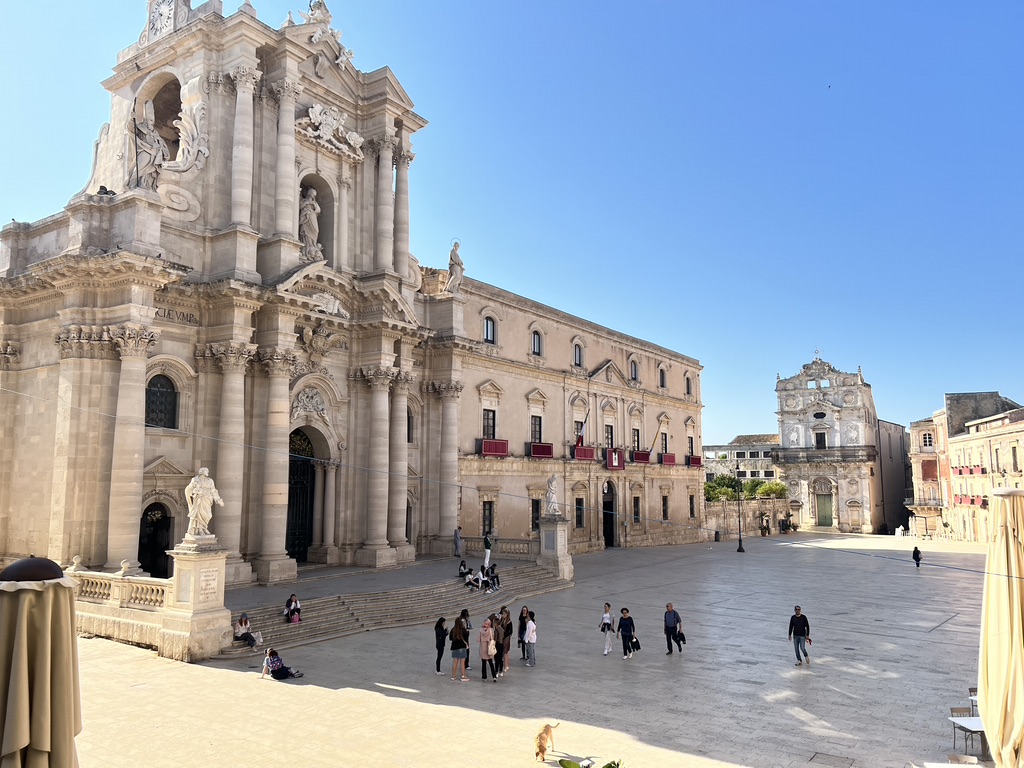
Online Minor in Italian
Through project-based learning, students in the new online Italian minor program will gain proficiency in the Italian language and enhance their historical, geographical and environmental knowledge of Italian culture, as well as research skills that allow them to develop innovative approaches to today’s significant cultural and social questions.
Study abroad in Italy
Why participate in a Global Education program?
- It is the fastest way to move toward professional-level proficiency in the language.
- Italy has a rich patrimony in all the arts — music, painting, sculpture, architecture, literature, theater, dance, and cuisine — that continues to influence contemporary culture in many ways.
- Italy has the highest number of UNESCO World Heritage sites.
- Italy has one of the longest life expectancies in the world due in part to the health benefits of its traditional Mediterranean diet and lifestyle.
- Global Education programs in Italy offer internships in many sectors such as business, tourism, fashion, food sustainability, health and wellness, design, and immigrant/refugee integration.
- If you speak or have studied another Romance language (French, Portuguese, Spanish), it is very easy to make rapid progress toward an advanced proficiency level in Italian while you are in Italy.
- Studying in Italy gives you access to many interesting Mediterranean cultures with complex histories. Check out the work of our Italian program alumnus and Rome-based journalist, Christopher Livesay.
Faculty-led programs
Spend four weeks in beautiful Recanati studying Italian for 20 hours per week and embarking on cultural activities, including lessons on art, cinema, history, music and gastronomy. Take half-day program-led trips within the Marche region and weekend trips to major cities — past examples include Florence, Perugia and Bologna.
Spend four weeks in the Sicilian seaside town of Siracusa learning about the dynamics of volcanic eruptions, earthquakes and tsunamis, concepts of geologic risk as well as the impact of natural hazards on people, places and culture and how they fostered resilience of the Italian people.
For a week in Italy, students will practice what they have learned in class with visits to city sites such as markets, cafes, restaurants, pastry shops, vegetable stands, news stands and more.
In 2013, the Mediterranean diet of several countries, including Italy, was added to the list of UNESCO’s list of Intangible Cultural Heritage of Humanity. Students will analyze the Mediterranean lifestyle, such as food and eating practices, from a historical, cultural, scientific and sociological perspective.
Poesiæuropa
A one-week conference hosted on Polvese Island (Lake Trasimeno, Umbria, Italy) and sponsored by the European Parliament, Poesiæuropa offers four to five annual fellowships for ASU students that cover meals and accommodation.
The SILC “Poetry from Many Worlds” initiative and the Italian Program are co-sponsoring one $1,000 scholarship to cover the travel expenses of one fellow.
For more details, email professor Serena Ferrando at [email protected].
For a full list of programs recommended for Italian majors, visit the Office of Global Education.
Scholarships and awards
This scholarship helps students pay for the Italian Global Intensive Experience in Italy where they will research and experience the Mediterranean lifestyle.
Funded by the Dante Alighieri International School located in Recanati to help Italian majors and minors pay for the Italian Language, Culture and Professional Experience in Recanati study abroad program.
Scholarships of varying amounts funded by Vista Higher Learning to help students pay for the Italian Language, Culture and Professional Experience in Recanati summer program.
- Lanterna Prize
The prize was established in 2021 and is awarded to the best environmental short film script by a student enrolled in the Italian ecocinema course. Starting in 2023, the Prize will include a $100 award.
Lanterna is the lighthouse symbol of Genova, Italy. Established in the 1100s, it is the tallest lighthouse in the Mediterranean at 250 feet (77 meters). As a lighthouse points the way forward and helps seafarers navigate, this award celebrates a student’s bright future and creative contribution to the fields of Italian and environmental humanities.
The Italian program is proud to announce the winners of this year’s edition of the Lanterna Prize, which is awarded to the best environmental short film script by a student enrolled in ITA/SLC 494 and ITA 598 Italian Ecocinema.
The 2024 winner is:
Gabriella Gonzalez with “Undergrowth.”
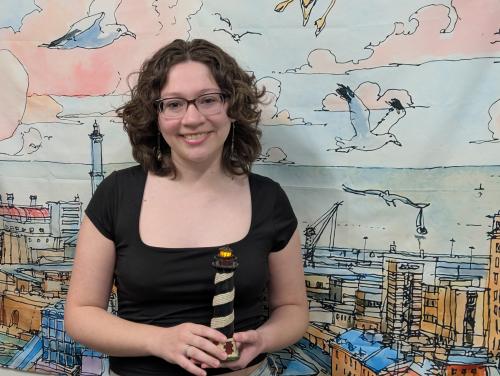
- Barrett College Fellows Undergraduate Research Program
In August 2022, the Italian Program welcomed Cooper Emmott and Michelle Dao as the Barrett Research Fellows for the 2022–2023 academic year. Cooper and Michelle are collaborating with Serena Ferrando on an eco-digital humanities project called Navigli Project that explores and digitally maps the cultural history of water in Milan, Italy’s self-described “city of water.” No knowledge of Italian is required for this project.
The 2023–2024 Barret Research Fellow is Richard Lingua.
The project is also part of the upper-level course ITA/SLC/HON 494 and CDH 598 City of Water: Uncover Milan’s Aquatic Geographies. For more information, please contact [email protected].
Club Italiano
Club Italiano welcomes anyone that is interested in learning about Italian culture and language to engage with the Italian language community at ASU in an informal setting. The meetings include games, movies, dinners, presentations and other activities that aim to engage in discussion about Italian life and society, as well as practice of the Italian language.
Pier Raimondo Baldini Italian Library
The self-checkout library — inaugurated in 2022 and dedicated to Emeritus Professor Pier Raimondo Baldini — holds over 1,000 books that were donated by friends of the Italian program. The library also serves as a study space for students and a meeting room for the Italian instructors.
People
Faculty
Alumni stories
Why did you decide to study Italian?
I decided to study Italian at the age of 18 after a brief visit to a small town in Friuli called Gemona. I was only passing through for a couple of nights, but my hosts were so gracious and friendly that I felt compelled to learn more about their language and culture. In fact, we became good friends and still see each other regularly.
You are an award-winning multimedia journalist. What impact has your knowledge of Italian had on your work?
I've spent the majority of my career as a journalist in Italy, so knowledge of the Italian language has been crucial. Without it, I wouldn't be able to communicate with my sources, read government press releases, or tap into society at large. I know some non-Italian journalists who somehow get by without ever learning the language. How unfulfilling that must be.
You live in Italy; can you describe three aspects of the “Italian lifestyle” that have positively surprised you?
The walk-and-pause. This happens when you're strolling with an Italian. When s/he wants to make a point, s/he'll stop walking, turn, and make eye contact to underscore this crucial piece of information.
Intimate knowledge of the human digestive system, other internal organs. Where an American might say "my stomach hurts," Italians of all ages would be more specific. I once heard a young boy say "my spleen hurts." I couldn't even point to where my spleen is.
Valuing the genuine. That goes for food, wine, craftsmanship, etc. But it also goes for people. I find Italians tend to have a very good nose for nonsense. It's one reason why no one there has a good opinion of politicians. (Ask an Italian to name a single MP they find redemptive in any way...besides Berlinguer or anyone else who's long dead).
What would say to ASU students that are starting their journey in Italian studies?
Italian is useless if you can't find ways of applying it. This can be tough if you're not living in the country. So find ways to make it indispensable to your psychic well-being. Fall in love with Fabrizio De Andre's music, Elena Ferrante's novels, Dante's poetry, and Pasolini's films. Then, reflect on the fact that you'll never fully unlock their delights and mysteries until you learn Italian.
Regan O’Kon graduated from ASU’s School of International Letters and Cultures in 2002 with a degree in Italian Studies and a minor in French. After receiving her Master’s degree, she returned to teach at SILC for five years and now works as a trade marketing manager for Campari America.
Why did you choose this language?
I had a full scholarship at ASU, but I also needed to work full time. I saw an Italian class offered on Tuesday and Thursday evenings, and I signed up. Initially, I thought it would be fun to know some Italian because I LOVE pasta. So much so, that when I was little and chubby, everyone said I had a "pasta pot." I still remember my first day and learning to say "Mi chiamo Regan." I immediately loved the sound of the language, and with the support of the department, I began taking major-level classes my second year. My initial love of pasta became a love of the language, culture, and literary tradition.
What did you like most about SILC? What helped you prepare for your future?
The atmosphere at SILC was encouraging and personal – I had direct contact with all of my professors. Juliann Vitullo, Piero Baldini, and Chiara Lage all encouraged me to take more classes and further my studies. I also liked the community atmosphere and the Italian Club pizza and cooking parties. Between studying and teaching, I spent 10 years at SILC. My longest tenure anywhere. I still miss my professors and my students. The skills I honed as an instructor have helped me immensely in my career in business. Teaching will always be one of my great passions.
How does language and culture help you succeed in your career?
I have the opportunity to speak Italian with many of my colleagues. Most importantly, I have a cultural perspective on important customs and traditions such as the aperitivo!
What kind of an impact did study abroad have on your language experience?
I studied abroad twice in undergrad in Florence, Italy and my second year of graduate school in Naples. My study abroad experiences remain some of my fondest memories. It changed my life and offered me a great perspective on the breadth of cultural diversity within countries. In graduate school, I studied Neapolitan dialect and culinary traditions!
I still try to "study abroad" each year in Italy. I love the country, and I miss it when I don't visit regularly. I am currently planning my honeymoon in Sardinia and brushing up on my Italian.
Any advice for current SILC students?
FOLLOW. YOUR. HEART. Don't be discouraged from people who look at you cross-eyed and say, "What will you ever do with that degree?" Nothing is more marketable than authenticity. Trust yourself and your dreams. In many jobs, you learn your duties on the job. It takes time, patience, and dedication to learn a language. That discipline is reflected in your work ethic.
Take your time. Working is always there. Enjoy your study abroad, drink wine, eat new foods, and make new friends.
When it came time to choose his major at ASU, Jeff Root looked to his deeply-rooted Italian heritage for guidance. When Root began at SILC, he was encouraged by his professors to push his abilities further, both through the study abroad program and the study of literature. Plus, Root said, a 16th-century quote from an Emperor also helped affirm his decision to pursue a future in Italian: “I speak French to the King, Spanish to God and German to horses – but I speak Italian to women.”
How did you land the job at De Cecco Pasta?
I was working for a foodservice sales brokerage firm as the Italian Food Specialist representing a tomato company, a cheese company and an olive oil company. The firm was looking for an imported dry pasta line to fill out its portfolio so I reached out to De Cecco Pasta in Italy through email. During my 3 year stay in Italy, I used De Cecco Pasta regularly in both of the restaurants I was working. I wrote an email to De Cecco headquarters - in formal Italian - explaining what the firm does for the foodservice sales industry and what we believed we could do for De Cecco Pasta in the Arizona market. They awarded us the opportunity to represent them in the Arizona market and over time I demonstrated to them my knowledge and passion for the product. I was then asked to come to work for De Cecco directly as the Regional Foodservice Sales Manager for the western half of the United States. I also am the key point of contact for national business opportunities in the chain restaurant segment.
How does language and culture help you succeed in your career?
Italian language and culture are critically important in my everyday work with De Cecco Pasta. Although we have our headquarters, entire production facility and international marketing office in Italy, we do have a logistic and sales support office here in the U.S. located in New York City. We are a small group of about 20 people; I am the only American-born foodservice sales manager in the U.S. so my communication throughout the day is almost entirely in Italian with both my boss and my colleagues. Measurements and vernacular relating to pasta, production, sales, marketing, point of sale, travel expenses, product training…it’s all done in Italian. I also am a key point of reference for translating material from Italian to English. The skills I use in my job came directly from my education at ASU and from my experience on the Study Abroad Program in Italy. If it were not for my Italian language and culture proficiency, there is no doubt I would not be working for De Cecco Pasta. The “Made in Italy” aspect is so fundamental to the strength of the De Cecco brand, and many of the distributors and chefs we call on are native Italian as well. Business relationships tend to thrive in an environment of trust and confidence and our clientele prefers salespeople who speak Italian well. I travel to Italy for meetings and occasionally take large customers to Italy for tours of our facilities. There are also several international trade shows here in the US where we showcase our product line.
Can you speak more about your study abroad experience?
I went on the Study Abroad Program in Florence when I was 25. I arrived about 10 days before the start of the program to stay with my Italian family in Gaggio Montano – located in the Apennine mountains about 90 minutes northeast of Florence. No one in the town spoke any English, so for 10 days, my Italian grew minute by minute exponentially. By the time I arrived in Florence I felt like I had learned more in 10 days than I had studied it in the previous 2 years in the U.S. When classes began in Florence I already had crafted a plan: I was going to excel linguistically, head back up to Gaggio Montano every single weekend throughout the summer and then return home to graduate in December…then buy a one-way ticket to move back!
I returned up to see my relatives every weekend. As soon as class ended on Thursday I was on a train back up the mountain. My language skills erupted as I became more expressive, infinitely more confident and relaxed with all facets of the Italian language. All of the grammar I was taught at ASU suddenly seemed to fall into place so effortlessly. I was also working at my family’s bed and breakfast in Gaggio Montano, so I was introduced to a myriad of settings where I constantly picked up new vocabulary. This experience shifted my life in an entirely different direction. After graduation, I sold my belongings, my car and packed the only 3 suitcases I owned. I bought a one-way ticket and I was back on a plane to Italy where I would spend almost the next 3 years. Without this experience, I would most certainly not be engaged in two of my life’s deepest passions: Italian food and the Italian language.
How did ASU and the language program prepare you for your future?
The department was very vibrant and active. Professors Baldini, Candela and Vitullo were instrumental in my development both linguistically and scholastically. Vitullo and Candela were paramount in my foundation as a future scholar in Medieval and Renaissance Italian literature, as to how to construct arguments and how to read texts for meaning. Baldini convinced me to go study abroad which ultimately changed my career in the most positive way. I think the most helpful part of the program was the introduction to so many important classical Italian literary texts. From Dante to Petrarca, an in-depth cinema course and an Italian business writing course furnished me with a very solid literary foundation for my eventual entrance into graduate studies.
Any advice for current language studies students?
Don’t lose faith. The process is long and it takes what it takes. Discover the length you’re willing to go to be successful – do you want to be content or do you want to be fulfilled? Some make it, some do not. Those who make it have a story to tell and it’s usually filled with moments where he or she could have taken the easy way, or even given up, but instead they chose to engage. Find out what you want to do with the language and literature and then pursue it aggressively and with purpose. You can’t expect results if you’re not willing to put in the work. If you go on the Study Abroad Program, don’t spend $5000 getting drunk every night and speaking English at that Irish Pub in Florence only to then skip classes. You can do that here in the US. If you decide to go then make the absolute most of it; Don’t eat at McDonald’s. Go grocery shopping. Experiment with recipes and food. Get out of the center of the city and go where there is no English spoken. Go out of your way to network and build up opportunities that could bring you back for an extended period of time.
Every setting in life is a classroom and you’re always receiving information. It’s your choice what to do with the information. Prior to getting on the plane to go study abroad, my Italian language proficiency was on life-support – and today I am at native-fluency level. Anything is possible!
Name Amanda Prahl
Graduation year 2011
Major BA English Literature; BA Political Science
Minor Italian
What's your current job?
I'm currently an MFA Dramatic Writing candidate, teaching a screenwriting class here at ASU and working on my third play which will have its first reading this November. I'm also a private piano teacher and a published freelance writer.
How does language and culture help you succeed in your career?
I often write about periods of history, particularly European history, and draw on knowledge gained from SILC courses; my previous play was in fact inspired by a historical figure I first encountered in a course on Renaissance Paris and Florence. I specialize in musical theatre, which has a rich and close relationship to the opera tradition, so my knowledge of that cultural institution has helped me both in my creative and academic pursuits.
How did ASU and the language program at SILC prepare you for your future?
As simple as it sounds, I feel like knowing a second language is a true asset and something that brings me a lot of joy, particularly because it allows me to connect to my own heritage. It also reinforced a detail-oriented approach to language in general, which is very useful for a professional writer.
What was your favorite thing about learning a language?
I'm going to cheat and say two things! First, the joy of learning the language of my not-very-distant-at-all ancestors, which allowed me to connect to the culture that has been an undercurrent of my whole life. Second, I love language and words in general, so getting to explore a whole new language - and meet some wonderful people along the way - was a true joy.
Any advice for current language studies students?
Don't expect too much of yourself all at once; take it in pieces. And above all, build a good relationship with your professors and fellow students, and never be afraid to ask for more explanation or help.

